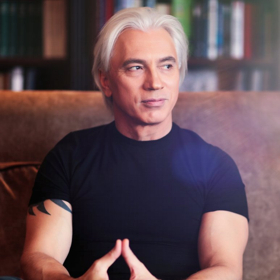Baritone Dmitri Hvorostovsky Has Died Following Battle with Brain Cancer

According to Opera News, Siberian Baritone Dmitri Hvorostovsky has died at age 55, following a battle with brain cancer. His family released a statement highlighting Hvorostovsky's accomplishments and celebrating his life.
They write, "In 1989, Hvorostovsky leapt to attention by winning the Cardiff Singer of the World Competition. Footage from the competition finals-the Verdi arias "Son io, mio Carlo," from Don Carlo, and "Eri tu," from Un Ballo in Maschera-demonstrate that already, at twenty-seven, Hvorostovsky had everything in place. He displays the creamy legato, polished phrasing, raw power and aristocratic stage persona for which he would become widely known. His Italian is natural and idiomatic, and it's obvious he understands the words. His rolled rs are exquisite. His voice is powerful, but it floats, so that it never feels heavy. There is a stillness, a dignified composure, that made him a natural fit for principled characters such as Rodrigo, or rulers such as Simon Boccanegra, the latter recorded in 2015 with Barbara Frittoli (Amelia), Stefano Secco (Gabriele) and Ildar Abdrazakov (Fiesco), with Lithuania's Kaunas City Symphony Orchestra and State Chorus, led by longtime colleague Constantine Orbelian."
Read the full statement in the original article here.
Hvorostovsky came to international prominence in 1989 when he won the BBC Cardiff Singer of the World competition, beating local favorite Bryn Terfel in the final round. His operatic debut in the West was at the Nice Opera in Tchaikovsky's The Queen of Spades (1989). In Italy he debuted at La Fenice as Eugene Onegin, a success that sealed his reputation, and made his American operatic debut with the Lyric Opera of Chicago (1993) in La traviata.
He subsequently sang at virtually every major opera house, including the Metropolitan Opera (debut 1995), the Royal Opera House at Covent Garden, the Berlin State Opera, La Scala and the Vienna State Opera. He was especially renowned for his portrayal of the title character in Tchaikovsky's Eugene Onegin; The New York Times described him as "born to play the role."
In later years Hvorostovsky's stage repertoire almost entirely consisted of Verdi operas such as Un ballo in maschera, La traviata and Simon Boccanegra. In 2009 he appeared in Il trovatore in a David McVicar production at the Metropolitan Opera with Sondra Radvanovsky.
In June 2015 Hvorostovsky announced that he had been diagnosed with a brain tumor and canceled all his performances through August. Family representatives said that he would be treated at London's cancer hospital Royal Marsden. In spite of his illness, Hvorostovky returned to the stage at the Metropolitan Opera in September as Count di Luna in Il trovatore for a run of three performances opposite Anna Netrebko.
Photo Credit: Pavel Vaan & Leonid Semenyuk
Comments
Videos

